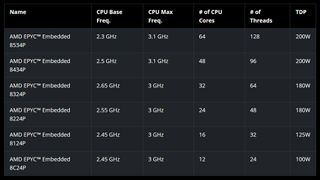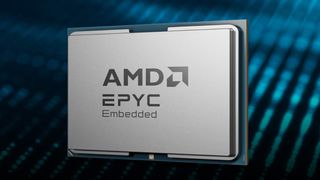AMD has quietly launched its EPYC Embedded 8004 Series of processors, aimed at high-demand applications such as networking, storage, and industrial edge environments.
Built on AMD’s “Zen 4c” architecture (the first processor series in the AMD embedded portfolio with these cores), they offer from 8 to 64 cores and support up to 1.152TB of DDR5 memory. With TDP values from 70W to 225W, the series is designed to combine power efficiency with reliable performance.
The lineup, based on the EPYC 8004 “Siena” series launched last year, features six models: the 64-core 8534P, 48-core 8434P, 32-core 8324P, 24-core 8224P, 16-core 8124P, and 12-core 8C24P, each catering to different performance needs.

“Siena” is coming to the embedded market
The 8224P, with its 24 cores and 180W TDP, is a standout due to its balance of power and affordability, making it a decent alternative to Threadripper Lite. The 8124P, with 16 cores and a 125W TDP, offers a budget-friendly option for multi-threaded applications without high power consumption. Also worthy of mention is the 12-core EPYC 8C24P which has a 100W TDP, but a cTDP range of 70-100W.
The new embedded processors come equipped with advanced features like Direct Memory Access (DMA) for offloading data transfers, Non-Transparent Bridging (NTB) for reliable CPU communication, and DRAM Flush to NVMe for secure data retention during power loss. With dual SPI for secure boot and Device Identity Attestation for preventing unauthorized modifications, the series offers data integrity and system security.
Built with a compact SP6 socket that’s 19% smaller than the Embedded 9004 Series, the EPYC 8004 Series fits into space-constrained systems while maintaining high efficiency. It has a seven-year lifecycle support, which isn’t dissimilar to the non-embedded 8004 processors, and includes Yocto Framework support allowing for optimized Linux-based operating systems tailored to specific embedded needs.
Summing up the new embedded processors, ServeTheHome says, “Slotted between the AMD EPYC 4004 series and EPYC 9004 series, the EPYC 8004 “Siena” platform is nice because it gives a large number of cores to a platform that costs less than the EPYC 9004 series, but that is more expandable than the EPYC 4004 series. For many applications, things like connectivity are more important than achieving maximum clock speed on a CPU. With the AMD EPYC Embedded 8004 series, the company is signaling that “Siena” is coming to the embedded market. To be clear, we think the EPYC 8004 is a stellar platform. We do wish, however, that AMD did a bit more branding work to differentiate why a chip is in its Embedded line.”







:quality(85):upscale()/2024/10/31/831/n/49351773/b7bf33836723d2f0643c55.51137847_.jpg)


 English (US) ·
English (US) ·